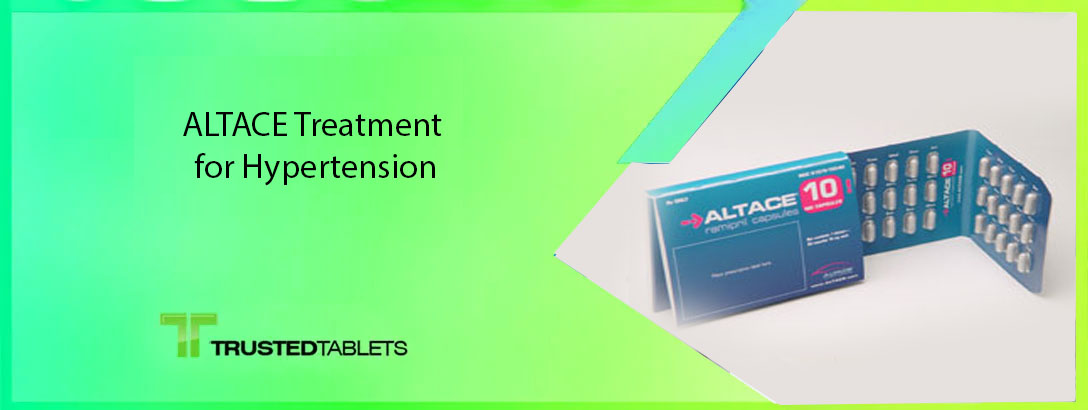The Role of ALTACE in Managing High Blood Pressure
High blood pressure, also known as hypertension, is a common but serious health condition that increases the risk of heart disease, stroke, and kidney problems. For many people, lifestyle changes alone aren’t enough to control blood pressure, making medication an essential part of treatment. One such medication is ALTACE.
What is ALTACE?
ALTACE (generic name: ramipril) belongs to a class of medications called ACE inhibitors (Angiotensin-Converting Enzyme inhibitors). It is prescribed to treat high blood pressure and reduce the risk of cardiovascular events.
How ALTACE Helps Manage High Blood Pressure
- Mechanism of Action: ALTACE works by relaxing blood vessels, making it easier for the heart to pump blood.
- Heart Health Benefits: It reduces the strain on the heart and helps lower the risk of heart attacks and strokes.
Who Should Take ALTACE?
- Recommended Patients:
- Individuals with hypertension
- Patients at risk of heart disease
- Those with diabetic kidney disease
- Contraindications:
- People with a history of angioedema
- Pregnant women
Dosage and Administration
- Standard Dosages: The usual starting dose is 2.5 mg once daily, adjusted based on response.
- Tips for Taking ALTACE:
- Take at the same time each day
- Follow your healthcare provider’s instructions carefully
Side Effects of ALTACE
- Common Side Effects:
- Dizziness
- Cough
- Fatigue
- Serious Side Effects:
- Swelling of the face or throat (angioedema)
- Severe stomach pain
Precautions and Warnings
- Safety Considerations:
- Regular monitoring of blood pressure and kidney function is essential
- Inform your doctor about any other medications you are taking
- Drug Interactions:
- Nonsteroidal anti-inflammatory drugs (NSAIDs)
- Diuretics
ALTACE vs. Other Blood Pressure Medications
- ACE Inhibitors Comparison: ALTACE is similar to other ACE inhibitors but has specific benefits in heart protection.
- Benefits and Limitations: Effective for many, though not suitable for all patients.
The Importance of Lifestyle Changes
Combining ALTACE with healthy habits can maximize its effectiveness:
- Diet: Low-sodium, DASH diet
- Exercise: Regular physical activity
- Stress Management: Mindfulness and relaxation techniques
Managing Side Effects
- Handling Common Side Effects:
- Stay hydrated
- Take ALTACE at bedtime if dizziness occurs
- When to Seek Medical Help:
- Persistent cough
- Signs of severe allergic reactions
Real-Life Success Stories
Patients have reported significant improvements in blood pressure control and overall heart health while using ALTACE.
Frequently Asked Questions about ALTACE
- How long does it take for ALTACE to work?
- Can I stop taking ALTACE once my blood pressure is normal?
- What should I do if I miss a dose?
Expert Opinions and Studies
Clinical studies have demonstrated the effectiveness of ALTACE in reducing blood pressure and protecting heart health.
Availability and Cost
ALTACE is available by prescription at most pharmacies. Insurance may cover a portion of the cost.
Conclusion
ALTACE is a trusted medication for managing high blood pressure and reducing cardiovascular risks. Along with a healthy lifestyle, it plays a crucial role in achieving better heart health.
FAQs
- What is ALTACE used for? ALTACE is used to treat high blood pressure and reduce the risk of heart attacks and strokes.
- How does ALTACE work? ALTACE relaxes blood vessels, making it easier for blood to flow and reducing heart strain.
- Can I take ALTACE with other medications? Consult your doctor to avoid potential drug interactions.
- What are common side effects of ALTACE? Dizziness, cough, and fatigue are common side effects.
- Is ALTACE safe during pregnancy? ALTACE is not recommended during pregnancy due to potential risks to the fetus.


